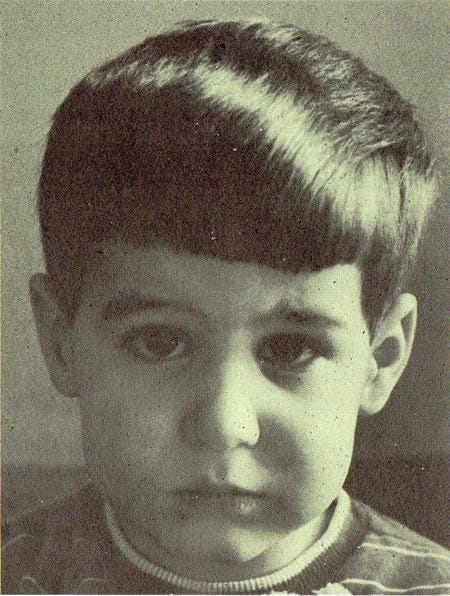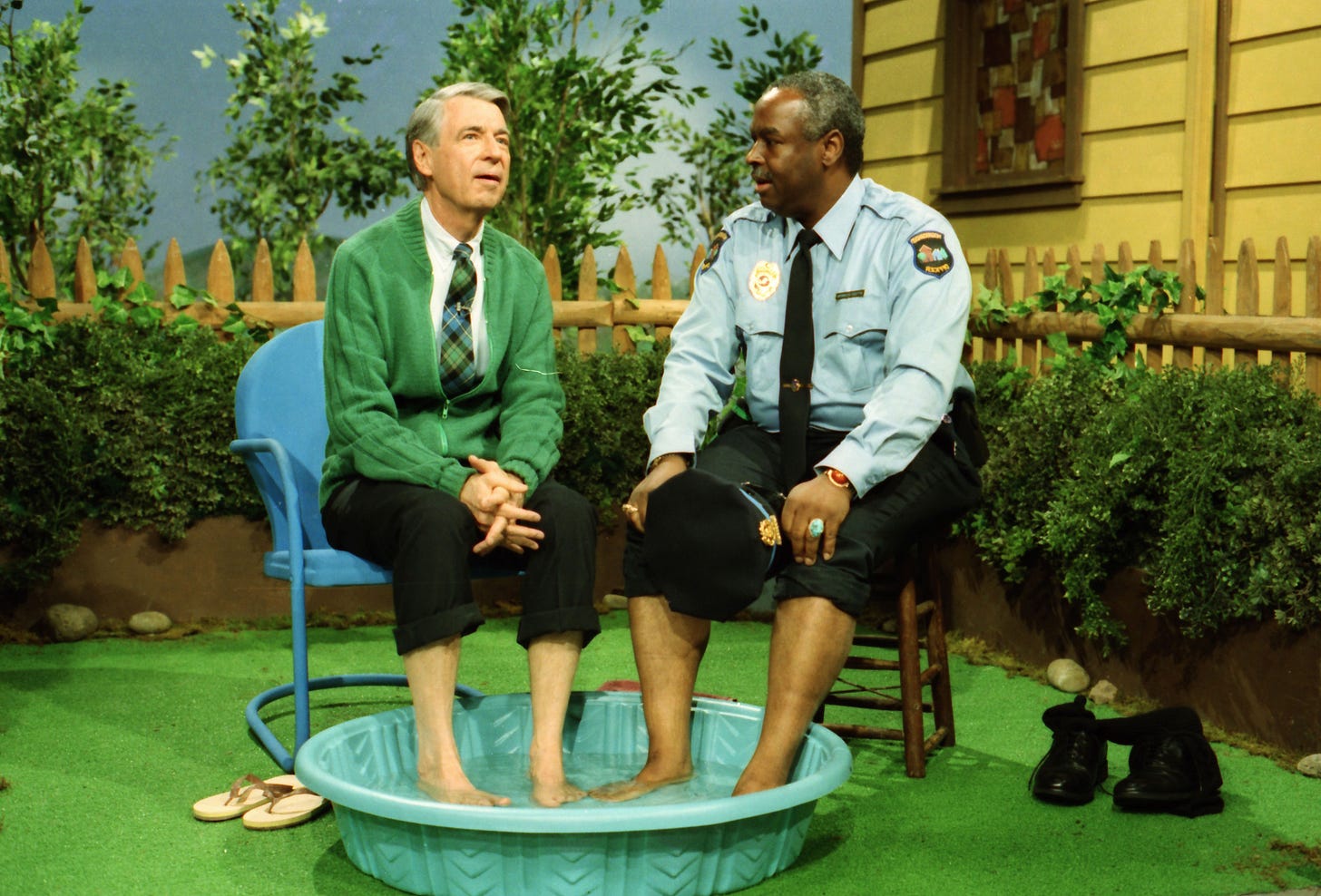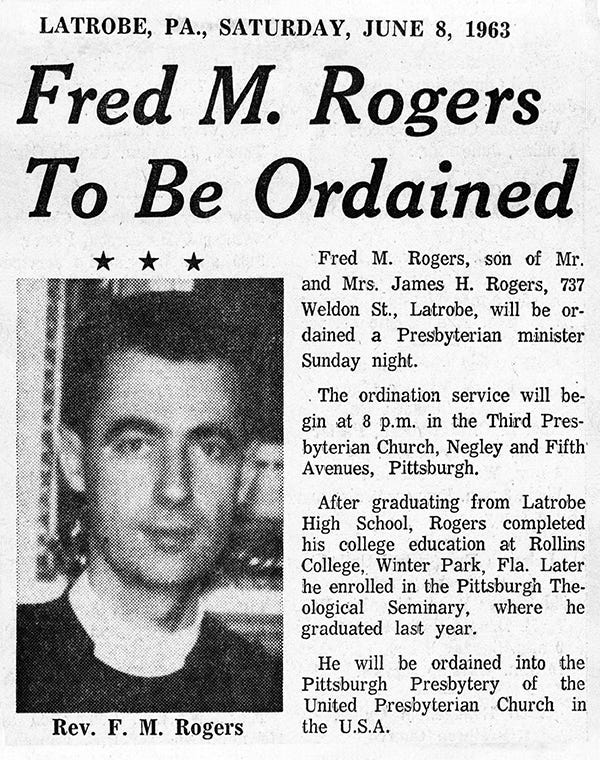Reverend Rogers' Neighborhood
Do you need to be a theological liberal to make a significant impact in the world?
You know him as Mister Rogers. Did you know that the more formal way to address him was The Rev. Fred Rodgers?
Yes, Mister Rogers (a stage name, really) was an ordained Presbyterian minister.
Was this a side gig? Was this something he did before he started in television? Afterwards? No. His subjective calling was to minister to children over TV. He was attending seminary while working for his first children's television show (before the one we all know).
Now I don't remember Mister Rogers ever mentioning Jesus, let alone God, in any episode I watched as a kid. Do you?
So what was the foundation of his calling as a pastor? How did his theology empower his positive influence in the world? How can our theology empower us to have a similar impact?
The Childhood of an Expert in Childhood
Mister Rogers was not always a "mister." He was born in a small town in Pennsylvania, into an affluent family. Regular attendance at the local Presbyterian church was a normal part of his life.
On top of that, his parents were very generous in sharing with their neighbors in need- something Rogers noticed, and even participated in: sometimes bringing up the needs of his school classmates to his parents, who would then find a way to support that child's needs.
Despite a comfortable standard of living, Rogers encountered several struggles while growing up: from health problems to bullying, it's hard to say that he had a particularly happy childhood.
While in college, it seems that Rogers started to realize that, despite childhood challenges, he had incredible support from his family- and that not every child had that advantage. At this time, he started taking a strong interest in early childhood development as a field- perhaps to help others find what he was privileged to experience himself.
First Inklings of a Calling
Although Rogers' father had hoped he would join and manage the family's business, like St. Francis, he felt called into the ministry. At first, he was not sure what this might look like. Then, one day after college, he saw his first television show, and it dawned upon him- this would be his ministry.
Rogers pursued television as a career at its inception. For a while, he lived in New York City, supporting this fledgling medium. He quickly saw its power but was disappointed in the direction it was taking- especially towards Children. He knew that TV could do so much more for kids than slapstick humor and commercialism.
As I mentioned, while working at his first children's TV show, he also attended Pittsburgh Theological Seminary.
Seminary or Cemetery
The experience of seminary can be disappointing for many. What initially sounds like a time of spiritual excitement and depth can ultimately become a cemetery for many students' faith.
When Rogers was attending seminary, his school was in the throes of the liberal/conservative controversies. These fights wore upon Rogers.
Nevertheless, he found his place in seminary, under the tutelage of Dr. William Orr. Orr was considered the most exciting professor in the school and was also known for his Christlikeness. Theologically, however, Orr was not quite orthodox, placing him on the liberal side of the theological debates. Although many thought Rogers reflected Orr's humble nature, he also adopted his mentor's theological perspective.
Progressivism was something he would hold on to the rest of his life, and you can start to see it in his later television Neighborhood. During a time of Jim Crow and segregation, he invited an African American actor to sit with him and soak his feet together in a kiddie pool. Although in some public pools the two men might not be allowed to swim together, Mister Rogers showed that this should not be the case. Afterwards, Mister Rogers even took a towel and washed this man's feet (compare John 13).
While in seminary, Rogers confirmed his desire to minister to children. As a result, the school encouraged (and provided the means) for him to expand his education into early childhood by making formal connections with experts in this field.
Called? Says who?
After graduating from seminary, it was time for him to go before his Presbytery and seek ordination. If you're not familiar with Presbyterian rules for the ordination of pastors, let me give you a crash course.
The journey to becoming a minister starts with a personal calling- a sense that God is asking you to take upon his mission distinctly. Now, all Christians have callings to follow God and promote his kingdom, but the calling to become a minister is different.
Still, who is to say that just because you feel a calling into ministry, God has called you? Unlike Elwood Blues, you can't just wake up one day and say, "I'm on a mission for God." There needs to be objective confirmation of that calling- and that's where the Presbytery comes in: to confirm more objectively what you experience personally.
While Rogers felt the subjective call to minister to children over television, his Presbytery initially rejected his call.
Now, I've always said, "Pick your polity, pick your problems." By that I mean, each way of governing a church has its struggles. Do you have an episcopal polity? Then you have a Bishop, and they alone get to make decisions about you and your church. If you have a good Bishop, everything will be fine. If not, you're facing all sorts of troubles. Do you have a congregational polity? Then your particular church has all the power. If you have a healthy church, everything is good. If not, you're facing risks at every turn.
Now I'm a Presbyterian who believes this is the best of several options. However, I have to admit: our form of government comes with challenges, too. Did you know that a presbyterian form of government is the basis of the U.S. Congress? How would you like Congress ruling your church? If you're a Presbyterian, that's your struggle. It was Roger's struggle, too.
Eventually, thanks to politicking and pressure by his supporters in his Presbytery, Rogers was ordained as a Presbyterian minister.
The Gospel According to Mister Rogers
After ordination, Rev. Rogers pursued his ministry. It would be several years, however, until it came into fruition as the show we all know.
But how did Rodger's theology affect his ministry? We can see it in his Christology.
For one, Rogers believed strongly in the Humanity of Christ- including his development from boy to man. Although the canonical gospels say little about it, the glimmers we have (think: the boy Jesus interacting at the temple of Jerusalem) show Jesus was growing up. When he was an infant, he still depended upon his mother for nutrition and protection. There's even a suggestion that he learned a trade from his father (Joseph- just to be clear). Jesus grew up.
Another aspect of Roger's Christology was his understanding that Jesus expressed emotions. I'm sure you've heard the shortest verse of the Bible: "Jesus wept." This episode wasn't the only time Jesus expressed emotions. How could he not? Jesus was human. No wonder Mister Rogers spent so much time talking about feelings and emotions in the Neighborhood.
A focus on the Humanity of Christ is a familiar chorus to liberal theology. In an attempt to be objective, some liberal theologians try to get away from the "myth" of the Divinity of Christ, leaving only his Humanity. It seems that this was a significant part of Rev. Rodger's Christology, too, which is consistent with his mentor, Dr. Orr.
I’m basing these claims of Rogers’ theology based on The Good Neighbor by Maxwell King.
Is Liberal Theology Our Only Hope for Change?
I think we all agree, Rev. Rodgers' ministry was very effective. Over several decades, he has made a significant and positive impact on the lives of children everywhere through television.
Is Rev. Rogers yet another example of why theological liberals make such a positive impact in the world, while conservatives do not? Does this mean conservative theology is dead and obsolete?
I think, with a closer look at Rev. Rogers' theology, we might find this isn't the case. You don't need to be a theological liberal to make as significant an impact as Rodgers did.
Take, for instance, Rogers' theology of the development of Christ. Is that just another liberal focus on human Christology? No. The early church father, Origen, drew heavily upon this concept in his fight against the Gnostics. This idea was so essential that I'd suggest he took it too far, even suggesting that Jesus did things the Scriptures did not record. Why so radical? Because, to redeem us, Jesus had to be like us in every way (Hebrews 2:17; 4:15). If Jesus wasn't human, he couldn't redeem humans!
Sometimes the idea of Jesus progressing can make Evangelical Protestants uncomfortable. Origen might suggest that conservatives, like the Gnostics, focus more on the Divinity of Christ than his Humanity. However, as the history of the church teaches us, we need to embrace fully both the Humanity and Divinity of Christ.
What about Rogers' theology of the emotions of Jesus? Sometimes the idea of Jesus' emotions makes conservatives. Protestants (especially more emotionally reserved White protestants) are uncomfortable. Does this belittle the Divinity of Christ? Is this just another liberal reconstruction of Jesus? No. This perspective is a case where our culture might incorrectly influence our theology. This idea is not just Roger's: B.B. Warfield (and nobody could accuse the author of the phrase "Biblical inerrancy" of being a theological liberal) has a beautiful article about "The Emotional Life of Our Lord," where he goes into depth, showing the breadth of Jesus' emotions. Why is this so important? Because it shows the Humanity (without denying the Divinity) of Christ and allows him, with unsinful emotions, to redeem us even if we (sometimes) have sinful emotions.
Although liberal theologians might dismiss the Divinity of Christ, conservative and classically orthodox theologians should not overreact to this by denying the full Humanity of Christ. As the Council of Chalcedon reminds us: Christ has two natures, one divine and one human, united in one person without confusion, change, division, or separation.
In other words, Rev. Rodgers' calling and focus on early childhood development could have been developed from a theologically conservative framework as much as a liberal one. There's no theological reason a conservative would not be able to have such an impact. So why don't we hear of more conservatives making a positive impact, like he did? The reason is not theological, but that is a topic for a different article.
The good news is that now that the lines in this controversy have been so deeply drawn (with separation into completely different denominations for each side), we are seeing conservatives start to broaden their scope. For example, I know several theologically conservative professional counselors who are educated and licensed by the state. This experience isn't much different from Rogers' time in seminary, as it involved sending him to experts in the field of child development.
We can see some of this in the controversy over Rogers' ordination. It seems the conservatives rejected his ordination because it was so atypical for a Presbyterian minister. Was this because they were "unimaginative," as some of Rogers' supporters objected? No. This objection stemmed from the fact that it was not a call to be a pastor. Their rejection is not necessarily a rejection of the importance or validity of this ministry to children or its mode of ministry- it's a statement that ordination is not a necessity for that ministry to occur. Whether or not Rogers was ordained would not have changed his ministry to children over television.
God calls all Christians to apply their theology to the marketplace. For instance, I am a marketing consultant. I serve my clients as a theologically conservative, but that does not require ordination to serve them. The same is true for mechanics, computer programmers, or whatever your career might be. Conservative theology can (and should) make a significant and positive impact in the world. We should encourage our fellow Christians to participate in the world, and we can do this without embracing liberal theology.



